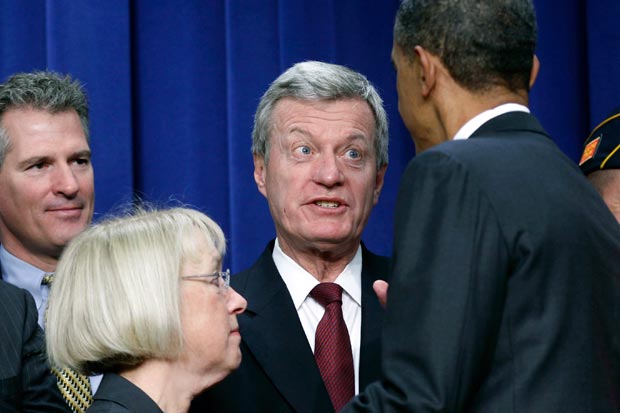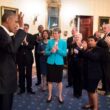(Obama and Baucus have the power to push for a carbon tax, says Bo Cutter: AP)
We are at an unacknowledged turning point for the economy and the environment. We could, right now, substantially reduce our debt and deficit projections, take a major step toward a better environment, create a simpler and fairer tax system, make job creation easier, and raise economic growth a bit. For all of these reasons, we could and should adopt a carbon tax.
Taking this step depends on two men: President Obama and Senator Max Baucus, chair of the Senate Finance Committee. Both men want to leave an important legacy, and both are in a unique political position: they still possess real political power, but neither will ever face another election. (Obama, of course, is limited to two terms, and Baucus has just announced that he will retire.) Acting together, the two of them could completely change the odds of enacting a carbon tax this year.
Why should we care? Let’s look at four issues: federal revenues, the tax system, jobs, and – oh, yeah – the environment.Right now, if you ask around, as I have, there are many across the ideological spectrum who agree that a carbon tax would help us solve a lot of problems, but they won’t take a public step because they see no leadership support. My own gut feeling is that there would even be energy industry support for a carbon tax. Obama and Baucus could change this picture by making a carbon tax a priority and building bipartisan support for the project.
First, a carbon tax of $20 a ton would raise about $120 billion a year, or $1.2 trillion over a decade. Right now, everyone anywhere near the budget debates is in a convenient and delusional state of mind about revenues. The conventional wisdom is that we either do not need more revenues or they are easy to find. So here are some counter-assertions: (1) despite the right’s imaginations, we are not going to cope with the retirement of the boomers, the doubling of folks on Medicare, and our need for fundamental infrastructure investment without new revenues; (2) despite the speeches the left makes to itself, the problem won’t be solved by taxing whomever the left decides is rich; (3) we aren’t going to end the home mortgage and charitable deductions. There will come a point when $1 trillion in new revenue over the next decade that actually makes the economy and the world a little better will look pretty interesting, so why not try for it now?
| There will come a point when $1 trillion in new revenue over the next decade that actually makes the economy and the world a little better will look pretty interesting, so why not try for it now? |
Second, the tax system is a mess and more caught in a state of political gridlock than even the rest of the federal budget. The system is far too complicated, and it probably lowers economic growth and job creation. More practically, raising new revenues from this structure is next to impossible; the 40-year strategy of broadening the base and lowering rates (a strategy I agree with) has played itself out. With the carbon tax’s $1 trillion, you could exempt low-income families, reduce the payroll tax, lower overall tax rates, and still bring down the debt and deficit. Sure, there would be fights about how to use the extra revenue, but those are fights the political system is supposed to have.
Third, jobs. We rely way too much on payroll taxes. They are very, very inefficient, and they directly and visibly add to the costs of job creation. Back when the U.S. economy was an unstoppable job machine, these taxes looked as though they were cost-free. Not anymore. I am optimistic about our long-term economic prospects, but I also think the jobs of the future will require much more education and training content than the jobs of the past, and therefore employers will be much more sensitive to other costs, i.e., taxes. Anything sensible we can do to make job creation easier and less costly is a step we should take.
Finally, the environment. A lot has been published recently about climate change and its sensitivity to greenhouse gases. Cutting through all of the models and the uncertainties, the net conclusion is that warming is probably a small bit less sensitive to greenhouse gases than we have thought. Climate change deniers have used this for the obvious purposes. But the actual end conclusions haven’t changed much. At current rates, we will put half a trillion more tons of carbon into the atmosphere by 2045 and 1 trillion more by 2080. Because of this the Earth’s temperature will probably warm about three-quarters of a degree in the next 30 years and 1.5 degrees over the next 50. (Thirty years may seem a long time to some of you; from my perspective, it’s a blink of an eye away.) And the math keeps suggesting that the earth’s sensitivity to extreme events is increasing more rapidly than global warming. So the future may be less hot but more dangerous.
Isn’t it worth a small amount of political difficulty and a fairly small tax now to slow down these trends? Everyone in politics talks a lot about political courage – mostly their own. As far as I can tell, political courage normally consists of doing something your supporters love and your opponents hate and then bragging about it. But maybe the two leaders I mentioned at the start will realize that they can afford to change that definition and leave a real legacy.
Bo Cutter is a senior fellow at the Roosevelt Institute.
This article was originally published in the Next New Deal.







0 Comments